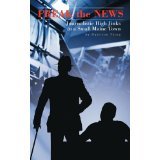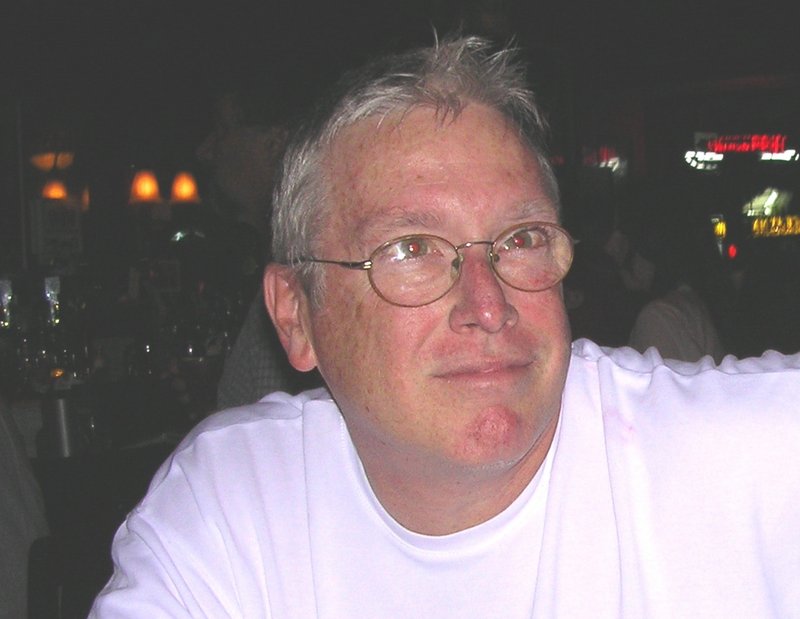Harrison Thorp knows the news business pretty well. He spent two decades at newspapers from Maine to Virginia, including The Portland Press Herald/Maine Sunday Telegram, where he worked as a copy editor. He specialized in writing witty headlines and trying to add humor, or at least some levity, to the pages.
Along the way, he acquired lots of great stories.
Those stories form the backbone of his new self-published novel, “Freak the News: Journalistic High Jinks in a Small Maine Town.”
The novel is about a guy named Chris, a seasoned journalist who returns to work the copy desk at a small Maine newspaper, and Shawn, a cub reporter. They team up on a story about a surgical death at a local hospital and an alcoholic physician, but newspaper executives kill the story. Further investigation reveals that the paper and the hospital have a business deal in place.
So, over the course of 250-odd pages, Thorp attempts to shake our faith not only in the hospital business, but also the news business.
Thorp, who lives in Lebanon on the New Hampshire border, says the book is not based on any single incident, but on a series of events that he witnessed over the course of his career. He combined those recollections and created characters based on people he knows and worked with to create the story.
Q: Explain the genesis of your story.
A: I worked at many newspapers and saw a lot of different newsroom cultures over the course of my career. When I got out of the business, I had a hilarious time looking back on the newsroom banter and funny things that happened. I had such a tapestry of stories that I really wanted to write something. It seemed to be a waste of a career to not do it. I considered very briefly — for a nanosecond — doing a memoir, but I think that’s gratuitous, and I didn’t see any market for it. So I invented through conspiratorial neurosis a fictitious plot that rang true. Pretty much everything in the book happened in some form or fashion.
Q: In your career, did your newspapers cover stories about surgical deaths?
A: I remember stories about surgical deaths and stories about infections, that sort of thing. That’s what they were called in curbside vernacular — surgical death stories. They were mostly about infections, basic perfunctory cleanliness things sometimes. These were usually national stories, and we would discuss them in the budget meetings. You know, “This might be worth a follow. This might be worth localizing,” that sort of thing.
Q: You seem pretty cynical about the news business. Why?
A: I think a lot of people don’t really get their opinions or views of politics or culture from the news anymore. They get it from bloggers and the Internet and Facebook. I think newspapers recognize that, and that is why you see a decrease in enterprise and investigative work. But I will say this: One thing newspapers do have, they have a system in place where they can report the news that goes on in neighborhoods and towns better than anyone else, because they have the expertise to do it. But I don’t see the big Pulitzer Prize-winning stories anymore.
When I was the Sunday editor at Foster’s (Daily Democrat in New Hampshire), we had reporters working on a story for a month. They didn’t do anything else during that time. But when that story came out, it would be important and timely. You just don’t see that as much anymore. You see a lot of really good day-to-day stuff, but you don’t see the big stories that you used to see.
Q: Where did you start your career?
A: I started by writing a (contributed) article for the Brattleboro (Vt.) Reformer about my basketball team. I couldn’t get any coverage, but they said, “Why don’t you write the story?” So I did. I was teaching at the time, but I worked for them as a correspondent in 1983 and 1984, and then in 1985 I went to the Recorder in Greenfield, Mass. I moved to Virginia for a better teaching job, and began working as a correspondent for the daily in Charlottesville. Again, I was mesmerized by the news business.
At the end of the school year, I elected to take a drop in pay and work for a weekly. That’s really where it started. From there, I went to Culpeper, Va., to work for a small daily.
I’m from New England — from Hingham, Mass. — and I had the chance to come back to New England when I got a job with the Portsmouth (N.H.) Herald, and did sports for a while. I got laid off there, and started working part-time for the Lowell Sun and part-time for The Portland Press Herald in the early 1990s. And then finally, I went to the Eagle Times in Claremont, N.H., and got a full-time job. It was an interesting time to be there. I was working the night that Lady Di got killed. It happened around 11:30 or midnight, and I remember tearing apart the paper. I stayed there until they started the Sunday at Foster’s. They gave me a call.
Q: Why did you end up in Lebanon?
A: When I came back to New England to work in Portsmouth, I went to a real estate office. They had a big map of the area. They asked me what I was making and when I told them, they said, “You can afford a house here,” and they pointed on the map to Lebanon, Maine.
Q: What do you want people to take away from this read?
A: When I used to write a column — any kind of sports column or a news column or an editorial — I liked to make people laugh, and then I liked to sneak in a message. When you are done reading and laughing, hopefully they still get the message, which is buyer beware.
Q: Any positives about the newspaper business these days?
A: I think it’s positive that they are still here. I was talking to one of the executives at Foster’s about a week ago. I said, “How’s it going?”
He said, “We’re finding new ways, finding new streams. We’re hanging in there.”
Q: Who are these people in the book?
A: All the names have been changed. The best cache that I have, I have worked at a lot of papers, but I am not working at one now. I can tell the truth.
Everything in that book in some way, shape or form did happen. They are writ from real life.
Q: How is the book doing?
A: It’s doing fairly OK. I am also trying to sell this as a journalism textbook.
I’ve had several journalism professors buy the book, because it’s a good book for Journalism 101. I am looking at everything from pursuing that idea to screenplays to the whole bit. I honestly think it could be easily turned into a screenplay, so I am shopping it. We’ll see.
Staff Writer Bob Keyes can be contacted at 791-6457 or at:
bkeyes@pressherald.com
Follow him on Twitter at:
twitter.com/pphbkeyes
Send questions/comments to the editors.





Success. Please wait for the page to reload. If the page does not reload within 5 seconds, please refresh the page.
Enter your email and password to access comments.
Hi, to comment on stories you must . This profile is in addition to your subscription and website login.
Already have a commenting profile? .
Invalid username/password.
Please check your email to confirm and complete your registration.
Only subscribers are eligible to post comments. Please subscribe or login first for digital access. Here’s why.
Use the form below to reset your password. When you've submitted your account email, we will send an email with a reset code.